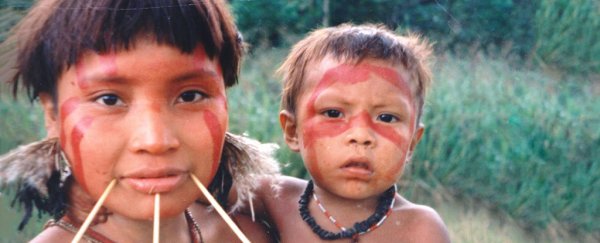Increasing blood pressure is a big problem among the ageing population, but you may be able to do something about it.
As a study on two remote indigenous tribes in the Amazon rainforest has just revealed, it seems like diet could be playing a key role.
On the border between Venezuela and Brazil, the Yanomami people maintain the same blood pressure for their entire lives.
And there's evidence that the absence of Western influences in the community may have something to do with it. The nearby Ye'kuana people do eat a small amount of Western-style food - and they are showing rising blood pressure as they age.
"The idea that rising blood pressure is a result of ageing is a widely held belief in cardiology, but our findings add to evidence that rising blood pressure may be an avoidable consequence of Western diet and lifestyle rather than ageing itself," said epidemiologist Noel Mueller of Johns Hopkins University's Bloomberg School of Public Health.
In most countries, blood pressure begins to rise from a pretty early age. Later in life, if left unchecked, it can result in a dangerous condition called hypertension, which is a risk factor in many life-threatening diseases, such as heart attack, kidney failure, and stroke.
It's been shown that salt reduction can help lower blood pressure, but some researchers have (controversially) found that low sodium correlates with an increased cardiovascular disease mortality rate.
And finding a population able to serve as a control group for Western diets isn't an easy feat.
This is where the Yanomami come in. They live primarily as hunter-gatherers, their diets high in fruit and fibre - and very low in fats and salt.
There have been studies that go back to the 1980s, the researchers noted, that show that atherosclerosis and obesity are almost unknown to the Yanomami, and that, typically, adults have very low blood pressure that doesn't increase as they get older.
None of these studies, however, included children, so the researchers conducted examinations of 72 Yanomami, aged 1 to 60.
They found that the average blood pressure among the Yanomami was 95 mmHg systolic (pressure during heartbeat) over 63 diastolic (pressure between heartbeats). This was consistent with previous research.
But this time, the researchers also found that this average was the case across all ages - from children through to the elderly.
For comparison, the average blood pressure in American adults is 121 over 71.
And for another comparison, there were the local neighbours. The Ye'kuana aren't as isolated as the Yanomami; they conduct trade with the industrialised world, and they do consume some processed foods in their diet.
The researchers examined 83 members of the Ye'kuana tribe, and found that their children had similar blood pressure to the children of the Yanomami. But the blood pressure among older Ye'kuana people was rising at a rate of about 0.25 mmHg per year.
By age 10, the Ye'kuana's blood pressure was, on average, 5.8 mmHg higher than that of the Yanomami, and 15.9 mmHg higher by age 50.
That's still not as high as the rates in America, which rise 1.5 mmHg and 1.9 mmHg per year among boys and girls, respectively, and 0.6 mm Hg per year among adults. But it could be an important clue.
Of course, it must be noted that the sample size here is relatively small, and additional factors such as genetics were not controlled for. However, the differences are striking, and suggest that parental intervention could help slow rising blood pressure from an early age.
"This age-related rise in blood pressure begins in early childhood - which suggests that early childhood may be a 'window of opportunity' for lifestyle interventions to prevent later rises in blood pressure," Mueller said.
The team's research has been published in the journal JAMA Cardiology.
